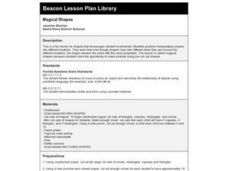Curated OER
Nine in the Sky
First graders explore the day and night sky and complete a page for the number 9 for their counting book.
Curated OER
Eight Stars in the Night Sky
First graders explore the day and night sky. They complete a number 8 page for their counting books.
Curated OER
Three Bears and Three Goats in the Morning Sun
First graders listen to the story Three Bears from the book, Three Tales of Three, focusing on the one-to-one correspondence while counting various items in the story. They create pages for the number 3 for their counting books.
Curated OER
Two Owl Eyes
First graders listen to the story, Olivia Counts, and demonstrate counting to ten. They make predictions, and recognize the day and night sky. They add page number 2 to their counting books.
Curated OER
One Sun, One Moon
First graders read "Ten Black Dots" by Donald Crews and then create their own counting books focusing on the number 1 (one) and using yellow dots to represent the sun, moon and stars.
Curated OER
What Counts?
Students practice counting from 1- 10 after listening to a read aloud of a counting book. They create their own counting books.
Curated OER
Magical Shapes
First graders practice manipulating shapes into different locations. They see that even though shapes may look different when they are moved into different locations, the shape remains the same with the same properties. They make...
Curated OER
Yummy Division
Second graders watch as volunteers divide large paper M&Ms on the board. They divide M&Ms into groups and write division sentences to show understanding of division concept. They eat M&Ms.
Curated OER
Doghouses, Doors and Design
Students engage in active problem solving as they create a design for a doghouse.They work in collaborative groups to complete their task. In addition, they explore numerical problems and develop unique strategies to assist them with...
Curated OER
How does the Earth compare to the other planets?
Students equate the size of the planets by determining their relative size. In this planet's size lesson, students use a variety of measurements to evaluate the sizes of the planets. Students share their comparisons and chart the...
Curated OER
Representing Relationships with Equations
Students explore Cuisenaire Rods. In this pre-algebra activity, students work with a partner to generate addition problems with the sum of ten using Cuisenaire Rods. Students construct examples of the Commutative Property using...
Curated OER
M&M Counting Fun
Students count up to 10 or more M & Ms using verbal names and one-to-one correspondence, as well as use sets of M & Ms to represent quantities given in verbal form.
Curated OER
Pattern Blocks to Understand Fractions
Students use pattern blocks to help them complete fraction problems. In this fraction lesson plan, students complete problems on worksheets provided.
Curated OER
Can You Measure This?
Fifth graders design their own house, while also using problem-solving skills involving perimeter and area. They exchange houses with a partner and find the perimeter and area of the window, doors, and front side of the house.
Curated OER
Bag the Beans
Students work in pairs to sort several beans into different piles according to a rule they make up. They use manipulatives to solve complex mathematical problems.
Curated OER
Fantastic Fractions
Students work in small groups to find pictures that represent the fractions 1/2, 1/3, and 1/4. They paste their examples onto bulletin board paper and share their results with the rest of the class.
Curated OER
Extending Geometric and Numeric Patterns
Young scholars study patterns. They construct growing patterns using pattern blocks and isosceles right triangles. They verbally describe the patterns and state the rule that describes the relationship involving the number of pattern...
Curated OER
States of Matter
Pupils study the vocabulary of the states of matter. In this states of matter vocabulary lesson, students investigate and study the meaning of the words solid, liquid, and gas. They experience demonstration lessons that give them...
Curated OER
Scale Models to Planet Size
Students consider the comparative sizes of the planets in the solar system. For this scale lesson, students select balls of different sizes to represent the planets in the solar system.
Curated OER
It Counts
Students understand and reinforce how numbers are assigned to objects, as well as think about more, less, or equal values. In this lesson, students are asked to describe, compare, and classify plants. They should be able to use numbers...
Curated OER
The Gathering and Analysis of Data
Young mathematicians gather data on a topic, graph it in various forms, interpret the information, and write a summary of the data. They present their data and graphs to the class.
Curated OER
The Nature of Mathematics
Students work in groups to describe plants using numbers. In this number lesson, students use numbers to define plants and then use numbers to write descriptions of themselves.
Curated OER
Paint Plus
Using the computer and the Paint program, Students explore the different tools available in the paint program, and then create a picture showing two sets of pictures and an equation.
Curated OER
The Great Button Sort
Students practice figuring out how items have been sorted. They also sort buttons in small cooperative groups. They color and sort their own paper buttons and then give their button sort to another student to see if he or she can figure...























